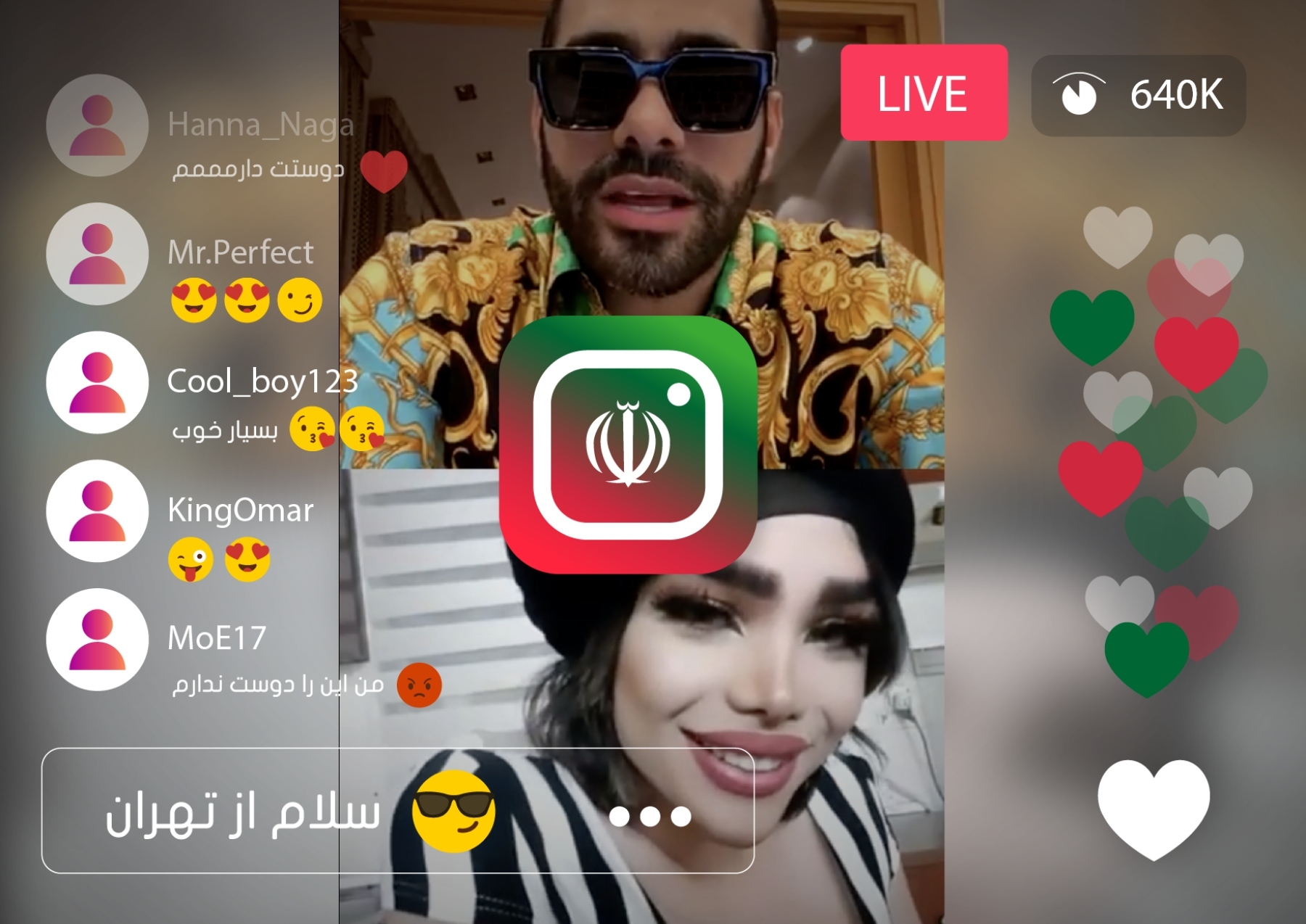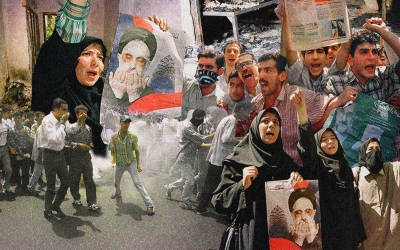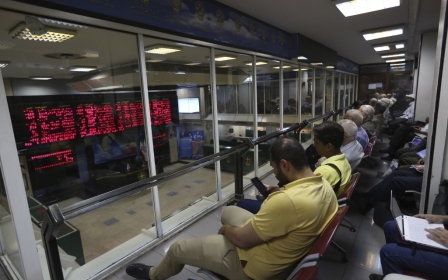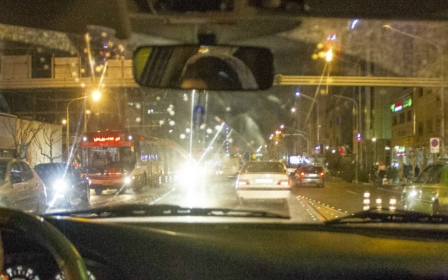Coronavirus: Under lockdown, Iranians turn to Instagram for taboo-breaking content

As Iranians have spent much of the past three months under lockdown in the Middle Eastern country worst hit by the coronavirus, many have, like elsewhere in the world, turned to the internet to find distractions from the pandemic.
Livestreams on Instagram - one of the few available social networks in the country - have become more and more popular, as Iranian celebrities have used them to attract more followers in various ways.
But these live videos have brought about an unexpected social dilemma in the Islamic republic, as their often explicit content has clashed with government-mandated modesty and social taboos.
As some bemoan traditional media’s loss of influence, and others worry about the impact of popular yet often sexist content, could the meteoric rise of social networks during the pandemic be used for the greater good?
Instagram gaining ground
During lockdown, Iranian print media and traditional news outlets have lost a lot of their status and popularity compared to their online rivals. Online media outlets include both official and unofficial sources, with the latter attracting a large number of readers as they are not subjected to the same state censorship and restriction.
Meanwhile, Instagram and Twitter are growing in popularity every day.
Instagram is among the few remaining open social networks in Iran, as Facebook and Twitter have been blocked for more than 10 years and are only accessible in the country through virtual private networks (VPNs).
While the press in Iran faces governmental supervision, Instagram has turned into a platform for Iranians to express their opinions freely or post uncensored photos of their daily lives.
One of the celebrities causing a stir on Instagram is flamboyant singer Amir Hossein Maghsoudloo, better known by his stage name Amir Tataloo.
Despite being based outside Iran for several years and currently living in Turkey, Tataloo has a wide Iranian following on Instagram. One of his livestreams recently broke the Instagram record for the number of viewers, with more than 640,000 people tuning in - obliterating the previous record held by US rappers Drake and Tory Lanez with some 315,000 viewers in early April.
Sexy streams
But what may have caused Tataloo’s livestream to gain so much attention? The answer might lie in the fact that he shared the screen with Neda Yasee, another Iranian Instagram celebrity, who has become well-known in Iran for sharing suggestive photos of herself.
The two took to Instagram live to talk about sexual experiences and fantasies, which likely aroused the interest of their mostly young Farsi-speaking fans.
Tataloo is not the only Iranian to grab the attention of followers through live videos and bringing up sexual issues on the social website.
Sasha Sobhani, the son of Iran’s former ambassador to Venezuela, is another Iranian celebrity who has been able to attract several hundred thousand people with his “Buttock Dance” challenge.
Currently based in Spain, Sobhani has shared the screen with girls logging on from all over the world in his livestreams, in which he asks them to twerk for him or perform other suggestive challenges.
‘We have always lived under such tough restrictions that for some celebrities to be breaking taboos is very appealing to us’
- Behzad, Iranian Instagram user
"Sasha is living the life of our dreams. I have always wanted to have so many girls around me like him. He is rich and having fun abroad," said Mohammad Reza, a 21-year-old Iranian who follows Sobhani’s Instagram page from Tehran.
The university student added: "Why shouldn't I watch his live videos? Watching (explicit content) stream live is a unique experience. I think all boys like watching these live shows. Anyone who denies watching them is too shy to confess to it."
For some, the societal and legal constraints surrounding sex and discussions of sexual topics in Iran also explain the interest in these videos.
"We have always lived under such tough restrictions that for some celebrities to be breaking taboos is very appealing to us," Behzad, another fan of the livestreams, explained.
Controversy
But the topics pushed forward by Iranian celebrities are rarely educational, and have often strayed from sex-positive discussions into the crude, sexist and, at times, downright illegal.
Sobhani, has garnered a reputation in Iran as a “pervert” for posting numerous pictures in which he surrounds himself with scantily clad women.
Meanwhile, 36-year-old Tataloo has used his Instagram stories to solicit young women and underage girls between the age of 15 and 20 to contact him for sex.
His posts have prompted children's rights advocates, lawyers and social media activists to launch a campaign against him, leading Instagram to shut down his account on 25 April.
That was not the first time Instagram took action against the rapper over his comments about women. In November 2018, the social networking website blocked his account for insulting and instigating violence against women after he had called on men to hit their wives or girlfriends.
Paran, 19, told MEE she was a big fan of Tataloo’s music.
"I think Tataloo is a great artist and singer that has been underappreciated in Iran,” she said. “No one can match him."
But the young Iranian woman said she did not appreciate his attitude on social media. “I watched a few of his first livestreams, but after I saw that they dealt with too many cheap issues, I decided not to watch them anymore so that I would not have to change my perspective on my favourite singer."
Large swathes of Iranian society are either religious or respect the religious and social norms of the Islamic republic. For many, these entail taboos around discussing sex and relationships openly, especially with parents and elders.
Within this context, many of these social media posts - which might be considered crude, but not pornographic, elsewhere in the world - are considered highly vulgar in Iranian society. However, most of the Iranian celebrities who are pushing these boundaries online live outside the country, sparing them from legal pursuit in Iran.
As this online content has become more visible, Iranian hardliners have repeatedly called for Instagram to join the list of social networks banned in the country. More recently, a group of clerics wrote a letter to the judiciary on 2 May, calling for the arrest of Minister of Communications Mohammad-Javad Azari Jahromi for not taking action to curb Instagram.
Understanding the appeal
But not everyone is worried that racy livestreams mean a degradation of Iranian society.
"The fact that such livestreams are so popular is not necessarily due to people's interest in them," said Fahimeh Miri, an Iranian journalist. "Many internet users watch such livestreams out of curiosity or even boredom during these days of self-quarantine.”
For Arameh Etemadi, a Tehran-based journalist focused on arts and culture, "perhaps we shouldn’t be surprised. Yellow journalism has always had a larger audience than specialised magazines”.
Not all Instagram livestreams these past few months have dealt with sex-related issues. Prominent TV presenter Reza Rashidpour has hosted a number of cultural and political discussions with different guests live on Instagram.
"Self-quarantine and isolation have turned social media into a serious opponent to big media,” the veteran presenter told MEE. “The reason is that what happens in individuals’ private lives is more interesting to people.
"In Iran, like in any other country, serious cultural, political and educational live shows are less popular than ones that show ridiculous and unusual things,” Rashidpour added. “The reason is that a lot of young people and teenagers are more interested in such things than serious issues, and it's natural that people don't always want to learn serious things and prefer to spend their free time having fun."
However, there has been some growing concern that the popularity of these lurid livestreams may be encouraging their creators to take things too far, as was the case with Tataloo.
"What we see in Tataloo's behaviour, as he started looking for sex with underage girls, is a result of his huge audience and millions of fans attracted to his livestreams, stories and posts," Etemadi said.
'It's natural that people don't always want to learn serious things and prefer to spend their free time having fun'
- Reza Rashidpour, TV presenter
"When you break Instagram’s viewership record, it will come as no surprise when your self-confidence is so high that you might think you can do anything,” she added. “When talking about sex on his livestreams breaks a record, one might wrongly reach the conclusion that he can have a harem for himself."
But for Miri, the latest Instagram scandals could become a much-needed lesson in media literacy for all.
“We need to educate the community not to watch anything worthless and to be able to distinguish obscene issues from instructive ones,” she said.
Rashidpour also refused to be fatalistic about the issue.
"I am not in a position to approve or disapprove of this kind of behaviour. I just want to look at the reasons behind it,” he said. “I think first we have to accept the existence of such an approach among the younger generation, and then we need to plan for it and educate young minds in a proper way."
This article is available in French on Middle East Eye French edition.
Middle East Eye propose une couverture et une analyse indépendantes et incomparables du Moyen-Orient, de l’Afrique du Nord et d’autres régions du monde. Pour en savoir plus sur la reprise de ce contenu et les frais qui s’appliquent, veuillez remplir ce formulaire [en anglais]. Pour en savoir plus sur MEE, cliquez ici [en anglais].







